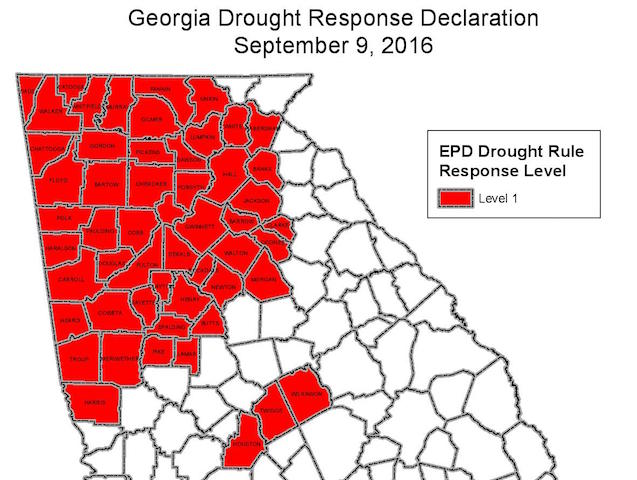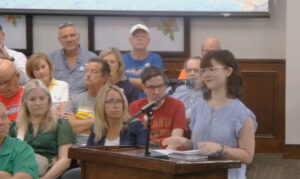Persistent dry conditions have prompted the Georgia Environmental Protection Division to declare a Level 1 Drought Response in 53 counties.
A Level 1 Drought Response declaration means local water utilities in the affected counties will be required to begin a public information campaign to help citizens better understand drought, its impact on water supplies and the need for water conservation.
“A Level 1 Drought Response is a good opportunity to partner with our public water utilities to promote good stewardship and to remind Georgians of the importance of using water wisely,” said EPD Director Richard Dunn.
According to the federal government’s U.S. Drought Monitor (http://droughtmonitor.unl.edu/Home/StateDroughtMonitor.aspx?GA), varying degrees of drought impact about two-thirds of the state. Nearly all of the counties affected by the Level 1 Drought Response declaration are experiencing severe and extreme drought conditions.
“Water utilities have already taken action to insure that water supplies are generally good and practicing effective water conservation will help provide sufficient supplies through the coming months if dry conditions persist,” said Dunn.
The public information campaign under a Level 1 Drought Response requires both groundwater and surface water utilities to circulate drought and water conservation information in one or more of the following: newspaper advertisements, water bill inserts, website homepages, social media and notices posted in public libraries.
The public information campaign will be required in the following counties: Banks, Barrow, Bartow, Butts, Carroll, Catoosa, Chattooga, Cherokee, Clarke, Clayton, Cobb, Coweta, Dade, Dawson, DeKalb, Douglas, Fannin, Fayette, Floyd, Forsyth, Fulton, Gilmer, Gordon, Gwinnett, Habersham, Hall, Haralson, Harris, Heard, Henry, Houston, Jackson, Lamar, Lumpkin, Meriwether, Morgan, Murray, Newton, Oconee, Paulding, Pickens, Pike, Polk, Rockdale, Spalding, Troup, Twiggs, Union, Walker, Walton, White, Whitfield and Wilkinson.
In addition, the outdoor water use schedule required under the Water Stewardship Act of 2010 remains in place statewide. This schedule allows outdoor water use year-round between 4 p.m. and 10 a.m. There are several exceptions, such as new plantings, listed at http://epd.georgia.gov/water-conservation.
“North Georgia has had a hot, dry summer and the fall season is historically a dry time of the year,” said State Climatologist Bill Murphey. “Current drought conditions are likely to continue through the fall season, although tropical activity and rain-producing systems can provide beneficial rainfall.”
Public water systems may not impose restrictions on outdoor watering that are different from the state requirements unless they obtain a variance from the EPD. Public water systems needing to impose outdoor water use restrictions more or less stringent than the state requirements may apply for a variance from the state’s current drought response and EPD is required to act upon that request within 5 business days. If conditions warrant in the future, EPD can declare additional drought responses to further manage water use.
The state’s rules for drought management and outdoor water use have changed since the last major drought. More information, including tips for water conservation, is available at http://epd.georgia.gov/water-conservation.












Leave a Comment
You must be logged in to post a comment.